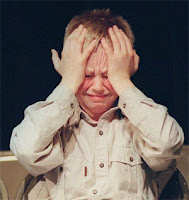Helping Children On The Autism Spectrum To Deal With Stress
"Is it common for a child with autism (high functioning) to quickly and easily get upset about little things throughout the day? The least little thing will set my son off."
 Children with High-Functioning Autism (HFA) often suffer from different types of stress compared to other kids. Stressors can be as diverse as school issues to the texture of their clothing!
Children with High-Functioning Autism (HFA) often suffer from different types of stress compared to other kids. Stressors can be as diverse as school issues to the texture of their clothing!These young people often suffer from so many obsessive thoughts that they are stressed out by things such as noise, smell, certain textures, things out of place, and disorder in general.
These "special needs" kids are perceived to be quite intolerant of others as well as the environment. They often become very anxious in unstructured settings and in situations where people are moving at random.
They may not be able to tolerate people standing close to them. Whether it is sudden or it comes from general background activity, noise can cause acute stress, fear and even panic and, at the very least, the youngster may be distracted and unable to concentrate.
They may not be able to tolerate people standing close to them. Whether it is sudden or it comes from general background activity, noise can cause acute stress, fear and even panic and, at the very least, the youngster may be distracted and unable to concentrate.
Each child on the autism spectrum will have his issues that stress him out. When they are younger, this kind of stress can lead to tantrums. Older kids can have anger outbursts or other evidence of distress when things aren’t going their way. They may swear or act-out in inappropriate ways to cope with their environment.
Sometimes a parent or sibling just needs to give in to the idiosyncrasies of the HFA child. They may need to keep the noise down or keep things in a specific order. Moms and dads may have to respect their youngster’s need for certain clothing textures or food preferences.
Lack of sleep can lead to stress in a child on the spectrum. Sleep disorders are very common. Medication or taking naps during the day may help ease the stress of sleep deprivation.
Some stress reduction techniques can be taught and are somewhat different from other stress reducing techniques. Your son may need to remove himself physically from the situation causing the anxiety. A quiet environment, free from distractions and where rules are followed rigidly can do much to help him concentrate.
Carrying a favored object can also give your son a sense of security. The nature of this object can seem quite bizarre to others (e.g., a "cat's eye" marble from the road), but without it, your son may be unable to settle or concentrate.
Some HFA kids derive comfort from repeating a set ritual of some kind that can be long and complex. It goes without saying that the ritual, however time-consuming, may have to be carried out in classroom situations, and the comfort object must be allowed to be present if the youngster is to be able to cope with the stressors.
When your son is upset, he is either wanting (a) immediate pleasure or (b) to avoid emotional pain. Upset feelings occur when the HFA youngster gets frustrated and has an unwillingness - or inability - to tolerate the necessary short-term discomfort that is sometimes required for long-term gain.
The opposite of this would be self-control, which is simply the ability to tolerate or cope with discomfort and hard work in the short-term in order to achieve one's long-term goals. Thus, teaching self-control methods to your son would be the ideal "fix" for his chronically feeling upset.
Some HFA kids derive comfort from repeating a set ritual of some kind that can be long and complex. It goes without saying that the ritual, however time-consuming, may have to be carried out in classroom situations, and the comfort object must be allowed to be present if the youngster is to be able to cope with the stressors.
When your son is upset, he is either wanting (a) immediate pleasure or (b) to avoid emotional pain. Upset feelings occur when the HFA youngster gets frustrated and has an unwillingness - or inability - to tolerate the necessary short-term discomfort that is sometimes required for long-term gain.
The opposite of this would be self-control, which is simply the ability to tolerate or cope with discomfort and hard work in the short-term in order to achieve one's long-term goals. Thus, teaching self-control methods to your son would be the ideal "fix" for his chronically feeling upset.
Resources for parents of children and teens on the autism spectrum:
==> How to Prevent Meltdowns and Tantrums in Children with Autism Spectrum Disorder
==> Parenting System that Reduces Defiant Behavior in Teens with Autism Spectrum Disorder
==> Launching Adult Children with Autism Spectrum Disorder: Guide for Parents Who Want to Promote Self-Reliance
==> Teaching Social-Skills and Emotion-Management to Children with Autism Spectrum Disorder
==> Parenting Children and Teens with High-Functioning Autism: Parents' Comprehensive Handbook
==> Unraveling the Mystery Behind High-Functioning Autism: Audio Book
==> Crucial Research-Based Parenting Strategies for Children and Teens with High-Functioning Autism
==> Parenting System that Reduces Defiant Behavior in Teens with Autism Spectrum Disorder
==> Launching Adult Children with Autism Spectrum Disorder: Guide for Parents Who Want to Promote Self-Reliance
==> Teaching Social-Skills and Emotion-Management to Children with Autism Spectrum Disorder
==> Parenting Children and Teens with High-Functioning Autism: Parents' Comprehensive Handbook
==> Unraveling the Mystery Behind High-Functioning Autism: Audio Book
==> Crucial Research-Based Parenting Strategies for Children and Teens with High-Functioning Autism



